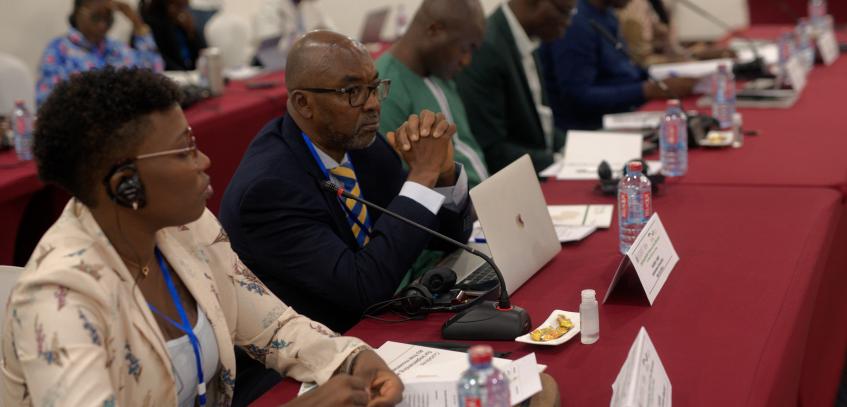The African Union Economic, Social and Cultural Council (ECOSOCC) in collaboration with Germany/ Deutsche Gesellschaft fuer Internationale Zusammenarbeit, GmbH (GIZ) convened a Regional Civil Society Organization (CSO) Sensitization Forum, from 17-19 May 2022 in Accra, Ghana on the African Union Continental Free Movement Protocol (FMP).
The Forum deliberated on institutional, legal, and policy obstacles, as well as opportunities, for the free movement of people in the ECOWAS and ECCAS regions.
The Forum observed that key obstacles, challenges and opportunities mainly relate to the linkages of free movement of people to governance, security, social and economic development; and in particular, intra-regional trade, climate justice, food security, medical sovereignty, and the creation of enabling environments for effective citizen participation and engagement.
In view of the above, the Forum made the following observations and recommendations:
1. Acknowledged that AU Heads of State and Government had adopted the requisite policy decisions on the free movement of people, including Agenda 2063.
2. The Forum commended the 12 ECOWAS member states that had already signed the FMP and the three (Niger, Sao Tome and Principe and Mali) that had ratified all relevant AU instruments on the free movement of people; and encouraged other ECOWAS and ECCAS member states which have not ratified to do so ahead of the upcoming 60th Anniversary of the OAU/AU in May 2023.
3. The Forum commended ECOWAS member states that issue visas on arrival to fellow African citizens and urged other ECOWAS and ECCAS member states to put in place necessary measures to ensure either the removal of visas for fellow Africans or the issuance of visa on arrival for African citizens without compromising the necessary security precautions.
4. The Forum appealed to ECOWAS and ECCAS member states to give full effect to the spirit of the FMP and refrain from imposing harsh penalties on fellow African citizens.
5. The Forum urged ECOWAS and ECCAS member states to address all institutional, legal and regulatory obstacles and as well as capacity gaps in order to give full effect to the FMP in the ECOWAS and ECCAS regions.
6. The Forum emphasized the need for ECOWAS and ECCAS member states to strengthen and deepen mutual trust for collaboration in addressing security, climate and humanitarian challenges that affect the free movement of people.
7. The Forum underscored the importance of structured and institutionalized collaboration between and amongst ECOWAS and ECCAS member states, immigration, defence, security and intelligence, humanitarian agencies and labour unions and civil society working in close collaboration with the relevant African, local government and international institutions in order to share knowledge and information, mutual assistance, scalable practices as well as develop requisite capacity development.
8. The Forum stressed the urgent need to modernize border management systems and rationalize labour migration, and other relevant policies.
9. The Forum urged ECOWAS and ECCAS to strengthen mechanisms for protection of migrants, refugees and IDPs within the two regions as well as combat xenophobia.
10. The Forum requested ECOWAS and ECCAS member states, the ECOWAS Parliament, and national parliaments to expedite the ratification, domestication and implementation of the FMP, pursuant to the African Union Assembly decision (Assembly/AU/DEC.607 (XXVII)).
11. The Forum implored ECOWAS and ECCAS member states that, in resolving any matters that arise within their territories, they should avoid taking such measures that would undermine the rights as enshrined in the FMP and related policy frameworks and become punitive to vulnerable communities.





